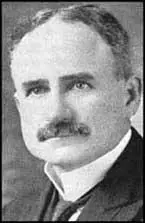Christopher Powell Connolly (C. P. Connolly)

Christopher Powell Connolly was born in 1863. He moved to Montana when he was twenty-one where he became a lawyer. An outspoken critic of corrupt business activities, he had an article about what was going on in Montana in McClure's Magazine in 1906. The Story of Montana, was followed by The Fight of the Copper Kings.
The success of these articles persuaded Connolly to become a full-time journalist. He wrote mainly for Collier's Weekly, but contributed material to most of the country's leading magazines. As a lawyer, C. P. Connolly was very careful about checking his facts. When one businessman, Caruthers Ewing accused him of writing articles that were "false and misleading", Connolly successful sued him for libel.
In 1907 C. P. Connolly reported on the trial of William Haywood, Charles Moyerand George Pettibone, three of the leaders of the Industrial Workers of the World (IWW). They were charged with taking part in the murder of Frank R. Steunenberg, the former governor of Idaho, and a strong opponent of trade unions. Charles Darrow, a man who specialized in defending trade union leaders, was employed to defend Hayward, Moyer and Pettibone. The trial took place in Boise, the state capital. It emerged that Harry Orchard already had a motive for killing Steunenberg, blaming the governor of Idaho, for destroying his chances of making a fortune from a business he had started in the mining industry. During the three month trial, the prosecutor was unable to present any information against Hayward, Moyer and Pettibone except for the testimony of Orchard and were all acquitted.
Mark Sullivan, the editor of Collier's Weekly, wrote: "Whenever in Collier's you find a passion for the sacredness of a fact, that is likely to have been written by Connolly. His zest in life was in finding the facts of a complex situation and most of the waking hours of his existence were spent in that absorption, in a concentration if all his faculties on comparing and testing and verifying, in separating the ragged shadows from the solid substance of truth, and finally in reducing the facts to what they were as God made them."
Christopher Powell Connolly died in 1935.
Primary Sources
(1) Mark Sullivan, editor of Collier's Weekly, commenting on the work of C. P. Connolly.
Whenever in Collier's you find a passion for the sacredness of a fact, that is likely to have been written by Connolly. His zest in life was in finding the facts of a complex situation and most of the waking hours of his existence were spent in that absorption, in a concentration if all his faculties on comparing and testing and verifying, in separating the ragged shadows from the solid substance of truth, and finally in reducing the facts to what they were as God made them.
(2) In his book, The Era of the Muckrakers, C. C. Regier wrote about C. P. Connolly's career (1932)
Whereas most of the muckrakers began as journalists, Connolly had been a business man and a lawyer, and it was the success of the Montana articles that led him to adopt a literary career. He wrote for various magazines, but especially for Collier's, for which he reported the Steunenberg murder, the McNamara trial, and the Leo Frank case.
